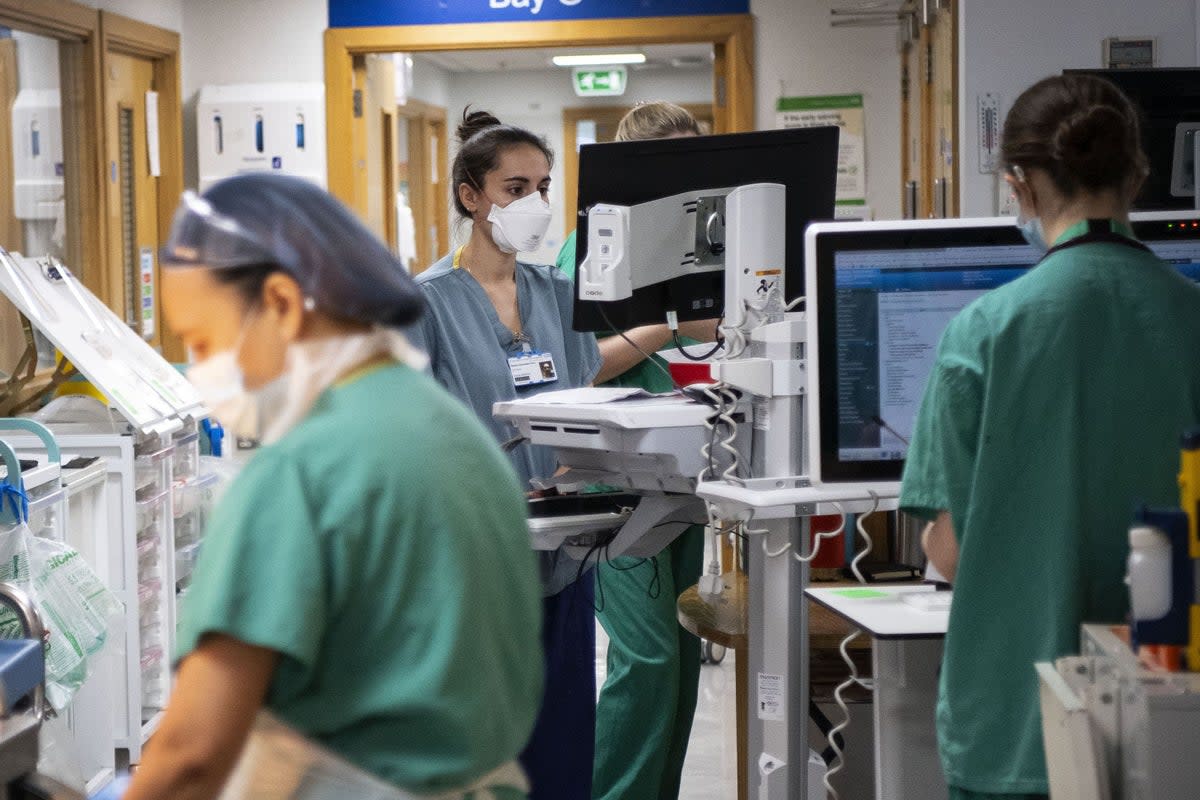Three in four NHS staff are struggling with mental health, new figures reveal

Three in four NHS staff have struggled with a mental health condition in the last year, according to a new poll.
A survey of workers carried out by NHS Charities Together over medics’ mental health comes as healthcare leaders were forced to reverse cuts to NHS Practitioner Health, a service for medics.
A backlash from NHS staff over the proposed cuts forced health secretary Victoria Atkins to intervene.
In the new poll of more than 1,000 NHS staff, 76 per cent said they have experienced a health condition in the last year with 52 reporting anxiety, 51 per cent reporting low mood, while 42 per cent of respondents also said they’d experienced exhaustion.
A separate survey published in February, covering hundreds of thousands of NHS workers found 41 per cent of staff reported being unwell in 2023 due to work-related stress.
Meanwhile, the most recent NHS data shows the most common reasons for staff sickness are anxiety, stress, depression or other psychiatric conditions, with more than 586,600 working days lost over this in November 2023.
NHS Practitioner Health began as a mental health service for GPs but has since expanded to other specialities following funding from NHS England.
However, last week the provider announced this national funding was due to end, so its service would be reduced.
NHS England said the decision was so it could review the services available for all NHS staff. However, it was forced to u-turn on the decision and agreed to provide funding for an additional year.
I have heard the concerns of NHS staff in recent days.
You deserve to have the right support.
After meeting with @NHSuk this morning, I am pleased that this important service will be maintained for both existing and new patients. https://t.co/XFOWsISfJi— Victoria Atkins (@VictoriaAtkins) April 15, 2024
The news comes as dozens of mental health hubs for staff, launched by NHS England after the pandemic, have also had to close following funding cuts.
This year the NHS faces significant cuts in a bid to make 2.2 per cent in efficiency savings following an agreement with the government.
In a statement about its poll NHS Charities Together, said: “Far from being a seasonal issue, ‘winter pressures’ are felt by NHS staff all year round. A huge 96 per cent of NHS staff surveyed said they believed that pressure on NHS services is growing.
“Faced with the responsibilities of saving lives, high workload, long and unsociable hours and exposure to traumatic events, it’s no surprise that many NHS staff are struggling with their mental health. These findings confirm how vital it is to prioritise mental well-being of the NHS workforce so that they can continue to deliver the best care for their patients.”
Ellie Orton OBE, chief executive of NHS Charities Together, said: “Staff working within the NHS do a hugely challenging job every day, often dealing with traumatic events most of us would never encounter. The majority of NHS staff love doing the job they do, and both NHS staff and the general public feel proud of our NHS.
But the nature of the work can have a detrimental impact on their mental health, and stigma can prevent them talking about it.
“Many NHS Trusts are already doing what they can to prioritise the mental health and wellbeing of our NHS staff, but it doesn’t go far enough. We will continue to work closely with NHS England and across the UK to ensure the additional support we provide for NHS staff has the most impact.
The organisations’ survey, which has launched a campaign called Support Both Ways, also found two in three staff reporting their morale is the lowest they have ever experienced and 70 per cent reported work had affected their mental health.

Steph Gorman, an intensive care nurse at Guy’s and St Thomas’ NHS Foundation Trust in London told NHS Charities Together, said: “I’m passionate about my work as a nurse. It’s hard, and I’ve had my struggles, but despite everything, it’s still one of the best jobs in the world. In the past, I’ve needed to seek help and started one-to-one counselling sessions at the hospital, which was really beneficial.
“Working as a nurse is still incredibly challenging. It’s so vital that we continue to invest in NHS staff mental health.
Sir Julian Hartley, chief executive at NHS Providers, said the “worrying” findings from NHS Charities Together is further evidence “that persistent pressure on the NHS is taking an enormous toll on staff”.
“Despite significant challenges, staff remain dedicated to delivering high-quality care to patients,” he added.
“But hard-working healthcare professionals cannot run on empty. Trust leaders are doing all they can to support their teams’ mental health and well-being, but national support is also needed.
“The recent cuts to central funding for NHS staff wellbeing hubs was a huge blow at a time when investment in these services is more vital than ever.”

